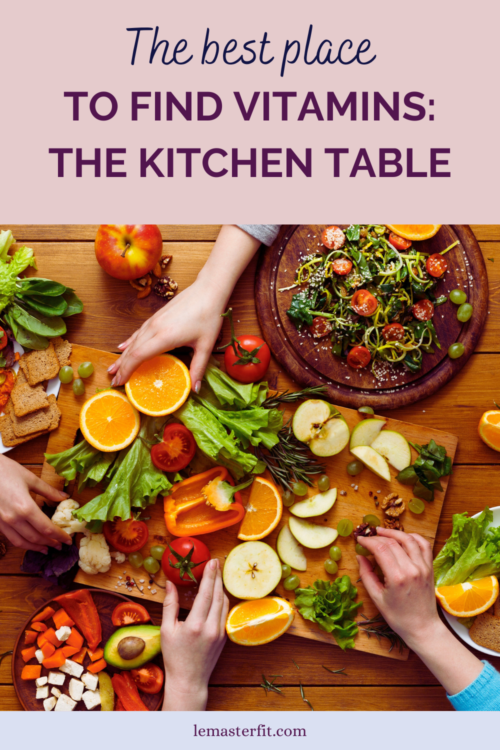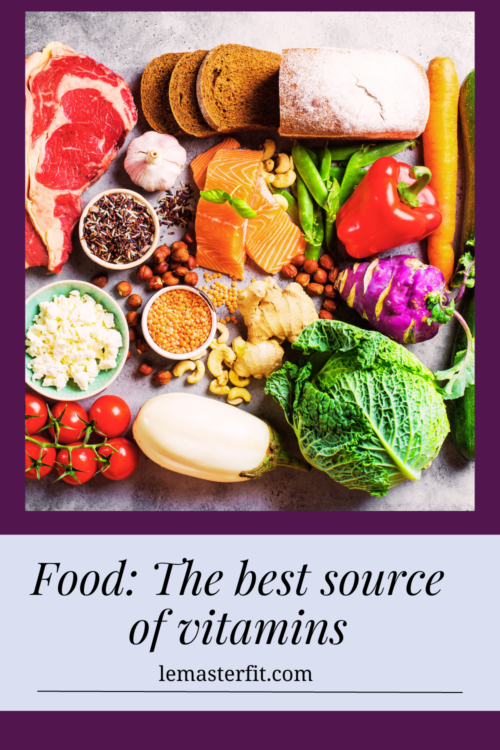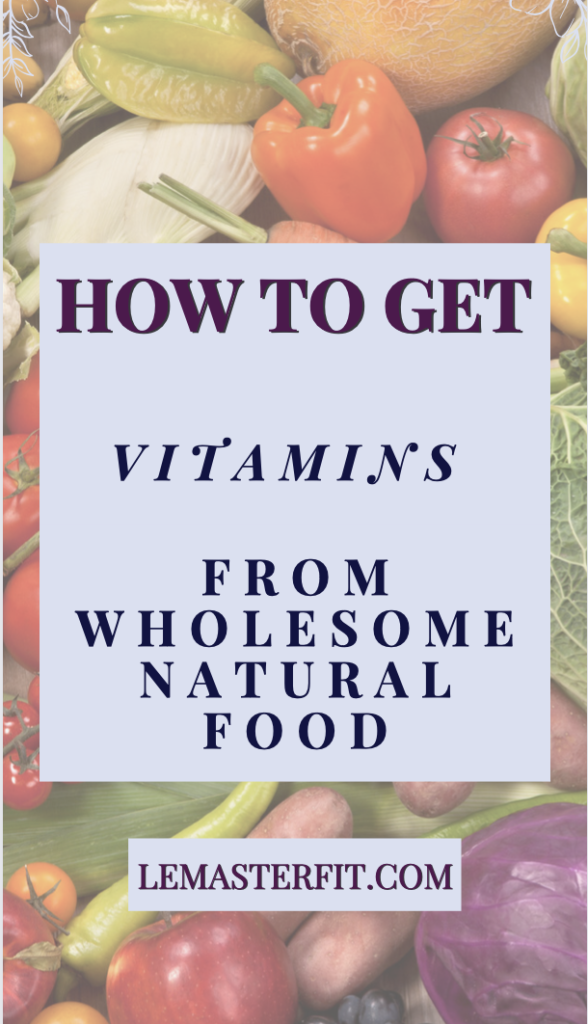What are vitamins?
Vitamins are essential nutrients because they serve thousands of functions in the body. Your body needs vitamins but, in smaller quantities than macronutrients like protein, carbs, and fats. Eating healthy foods and having a balanced diet will help you get the health goals you desire–its important to look at food as fuel, as sources of nutrition and fuel your body and cells need to function, growth, develop, repair themselves, and allow you get stronger, leaner, healthier all around.
Your body does a lot for you.

Our cardiovascular system pumps blood throughout your body, providing the oxygen to your muscles during exercise. The brain recalls facts and knowledge for your next exam, debate, or general life decision. The brain formulates little chemical messengers as hormones that communicate with your organs, tissues, and cells to signal things like, hunger, fullness, illness, muscle movement, and the basic instructions for the miracle of the body to sustain your life. No matter what challenges life throws your way, your weekend adventures, and the lessons you learn through school, and through life, you rely on having a healthy body.
What happens if we don’t fuel our body?
But how can you expect our body to do this if you don’t give your body the fuel it needs? That’s like expecting your car to drive from Ohio to Florida without filling the fuel tank with gas. You won’t get far, the car would struggle, and eventually, the car just gives up. This is what happens when you go without food or grab a quick bite of nutrient poor potato chips and pop–you might have a burst of energy but you will crash later.
How do you avoid the crash and give your body the fuel it needs–by having a healthy, balanced diet with all the vitamins and minerals you need? Look at food as fuel, not as a feeding frenzy for your emotions.
How does cooking impact vitamins?
Your body needs at least 30 vitamins, minerals, and macronutrients that come from the food you eat. Vitamins and minerals are essential for the body–meaning your body can not make these compounds by itself.
These compounds help build and maintain strength in bones, heal wounds, and improve and strengthen your immune system.
Vitamins are organic and break down when you add heat (cooking) or acid (like lemon juice). Minerals withstand heat and acid more robustly. What does this mean? Certain cooking techniques can cause vitamins to break down faster.
Avoid vitamin loss in vegetable preparation and cooking by:
- Leave the peel on fruits and vegetables as the peels contains vitamins and fibre.
- Use a sharp knife. A blunt knife causes cell damage which leads to Vitamin C loss.
- Cook vegetables as soon as you prepare them. Don’t soak them in water as water-soluble vitamins (B and C) leak out.
- Use a small amount of water, or preferably, steam vegetables. Save the cooking water and use it in soups, stocks, or gravies.

What vitamins do you need?
Water soluble vitamins
You need to replenish water soluble vitamins every few days because these vitamins are flushed out regularly through urine. This group of vitamins includes the B vitamins and vitamin C. Vitamin B’s are important for coenzymes to make and release energy from your meals. Vitamin B’s also build proteins and help cells multiply. These vitamins help break down and use amino acids to maintain healthy tissues and strong muscles. Vitamin C is a critical part of our immune system.
- Vitamin B1 (Thiamin) aids in cell growth, development, function, and helps your body metabolise food and nutrients needed for brain function.
- Vitamin B2 (Riboflavin) helps break down macronutrients and helps the body absorb iron, zinc, and calcium.
- Vitamin B3 (Niacin) is a critical component of the enzymatic system and helps repair DNA.
- Vitamin B5 (Pantothenic acid) helps the enzymes in your body break down fatty acids and metabolise food and increases good cholesterol.
- Vitamin B6 helps break down macronutrients, supports immunity, and maintains a healthy function in the heart and brain. Too much Vitamin B6 can damage nerves and can cause muscle weakness.
- Vitamin B7 (Biotin) helps break down, metabolise, and use all the food you eat.
- Vitamin B9 (Folic Acid) helps form red blood cells, promotes healthy development of neural tubes during pregnancy, and helps prevent chronic diseases.
- Vitamin B12 is essential to make and repair DNA and also helps maintain healthy brain function. Vitamin B12 is only found in animal sources, especially meat.
- Vitamin C helps the body absorb iron, used to repair tissues, helps your immune system fight off bacteria and viruses and improves overall health. We also need vitamin C to absorb iron. Too little vitamin C causes bleeding of the gums, fatigue, and a weakened immune system.
Fat soluble vitamins
Fat soluble vitamins need to be absorbed with the use of proteins such as the proteins found in meat. Meat also contains fat and the fat particles from the meat cover the fat vitamins. Fat-soluble vitamins need to be ingested with fat for the body to absorb the nutrient. Because fat-soluble vitamins are stored in the liver and fat tissue so its important to consume these vitamins in moderation.
1. Vitamin A stimulates new cell growth and keeps your eyes healthy for powerful vision.
2. Vitamin D helps your body absorb calcium faster and more abundantly–and this occurs primarily if you consume vitamin D and calcium with fat as vitamin D is fat soluble (absorbs into your body with fat). Vitamin D also helps the body absorb more vitamin C, iron, and vitamin B. Want to get a dose of vitamin D, just go outside and catch some rays. If you live in an area like Florida, you likely don’t need a vitamin D supplement but, if you are in an overcast area or have longer periods of dark nights because you took a trip to Alaska in the winter, invest in vitamin D supplements.
3. Vitamin E protects cells, muscles, vitamin A, and fatty acids from being broken down–but can be destroyed during high heat from cooking. Deficiency leads to anaemia and sterility
4. Vitamin K helps blood clotting and wound healing, but if you take a blood thinner, avoid too much vitamin K because it prevents blood thinners from working correctly.
I’ve made a guide on these vitamins and where to find them in your food!
What’s the take away?
Vitamins support your health in various ways. Your body needs vitamins to support function, repair, grow, and develop. Unhealthy lifestyles and diets can cause vitamin deficiencies which can impact everything from your eyesight and bones to immune system, and skin and muscle and overall energy levels. The best thing you can do is make sure each meal is a balanced diet with proper nutrition. A good rule of thumb is having a colourful plate where the “colours” come from fresh, wholesome, natural foods such as fruits, vegetables, and a balanced diet of protein, fat, and carbs.

Leave a Reply